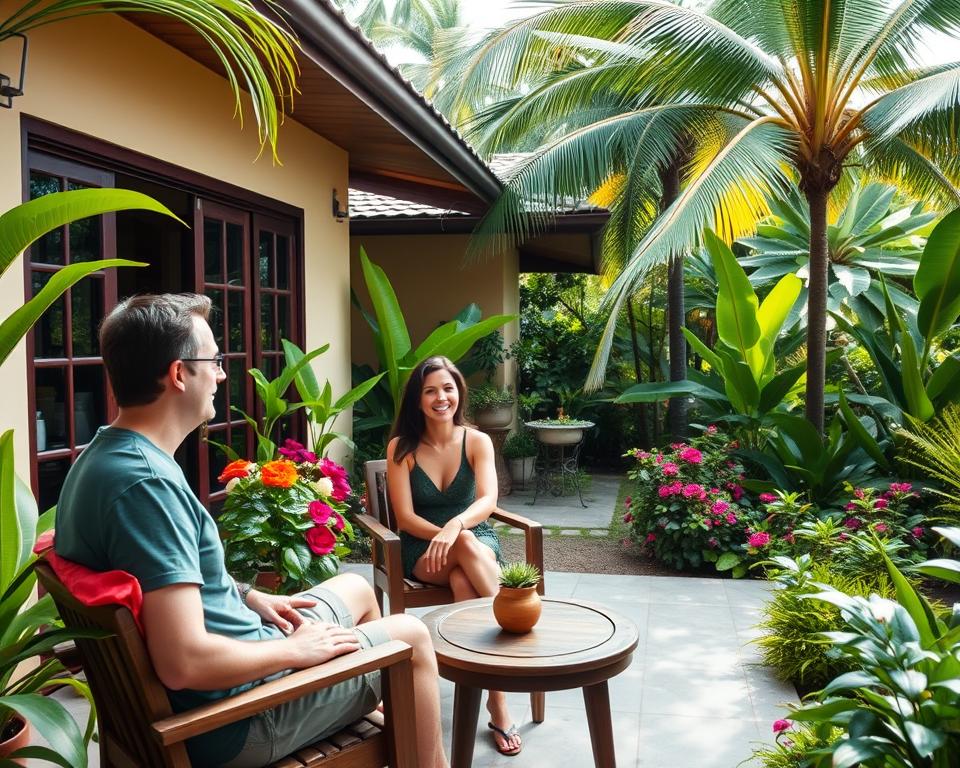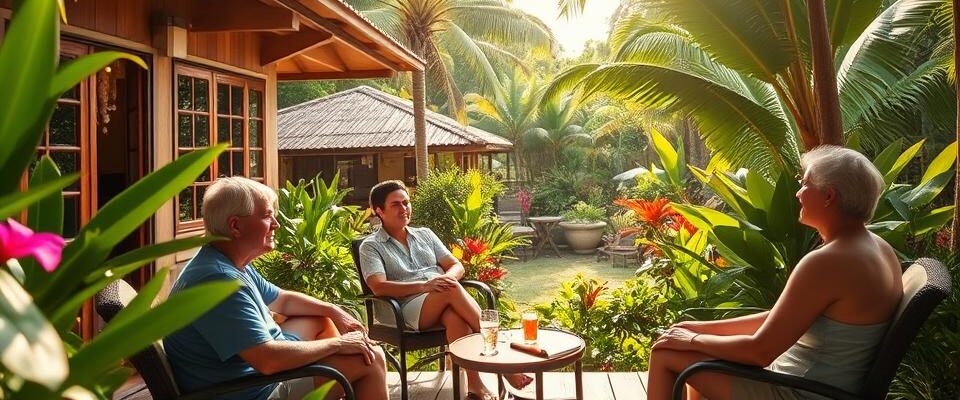How to Stop Squatters in Costa Rica – Property Protection
Do you know about the hidden risks that could harm your Costa Rican property? Squatters can turn your investment into a big problem.
At Gap Real Estate, we know how important protecting your property is in Costa Rica. With over 20 years of experience, we have strong plans to keep squatters away.
Costa Rica’s squatter laws are tricky and can surprise property owners. Did you know squatters might get legal rights after just 90 days without anyone stopping them? Our guide will help you understand how to stop squatters and keep your property safe.
The squatter laws in Costa Rica are complex and can catch owners off guard. It’s key to know these laws to protect your property well.
We’ll explore the legal ways, preventive steps, and strategies to keep your property safe from squatters. This is important for both current owners and future investors in Costa Rica’s real estate.
Understanding Costa Rica’s Squatter Rights Framework
Costa Rica’s property rights are complex. The country has rules for squatters that affect property ownership. Knowing these laws is key for anyone dealing with real estate here.
The laws on adverse possession in Costa Rica are tricky. Property owners need to watch out for legal limits. These limits could change who owns the land.
Legal Foundations of Property Occupation
In Costa Rica, squatters can claim ownership under certain rules. Important parts of these rules include:
- Continuous occupation for a minimum of ten years
- Open and uncontested possession of the property
- Demonstration of good faith use of the land
- Absence of legal challenges from the original property owner
Time Requirements and Legal Thresholds
The law sets clear times for when property rights can change. Squatters can own a property after ten years of continuous occupation. Owners must act fast, within the first three months, to protect their rights.
Property Owner Rights and Obligations
Owners must protect their property rights in Costa Rica. This means:
- Maintaining clear documentation of property ownership
- Conducting regular property inspections
- Addressing any unauthorized occupations immediately
- Understanding local legal procedures for property protection
Costs for defending property rights can be $1,500 to $3,000. This depends on the situation and land size. Owners should be ready for legal costs and get professional help.
How to Stop Squatters in Costa Rica

To keep your property safe from squatters in Costa Rica, you need to act fast and be proactive. It’s tough to remove trespassers, but there are ways to stop and handle unauthorized people on your land.
When dealing with squatters, acting early is key. Here’s what we suggest:
- Regularly check and care for your property
- Put up strong fences and warning signs
- Keep your property records up to date
- Pay your property taxes on time
- Hire local caretakers or property managers
The process of removing squatters in Costa Rica has important steps. First, document any unauthorized entry right away. Having photos and witness statements can help with legal actions.
Getting legal advice is crucial when facing squatters. Costa Rican property laws are complex. A local real estate lawyer can guide you through the eviction process.
The best way to avoid squatters is to stay active on your property. With strong security, you can greatly lower the chance of unwanted visitors.
Critical Prevention Measures for Property Protection
Protecting your property in Costa Rica needs a proactive plan. Our strategy includes many layers to stop squatters. It’s all about keeping your property rights safe.
Securing empty properties in Costa Rica requires more than just locks and fences. We suggest a detailed plan for protecting your property.
Essential Security Infrastructure
Good property protection starts with strong security systems. Key parts are:
- Installing surveillance cameras
- Implementing perimeter fencing
- Using motion-sensor lighting
- Setting up alarm systems
Documentation and Record Keeping
Keeping detailed records is key to stopping squatters. Property owners should keep:
- Updated property tax records
- Comprehensive ownership documentation
- Regular property inspection logs
- Detailed maintenance records
Regular Property Maintenance Requirements
Regular upkeep is a strong way to keep squatters away. The Public Registry in Costa Rica tracks property history. Our maintenance plan includes:
- Periodic property visits
- Immediate repair of any damage
- Keeping the property visibly cared for
- Maintaining landscaping and exterior appearance
By using these key prevention steps, property owners can lower the chance of squatter occupation. This helps protect their investments in Costa Rica.
Legal Actions and Enforcement Procedures
Property owners in Costa Rica have many legal options to fight squatters. Knowing how to take legal action is key to getting your property back quickly.
When dealing with squatters, property owners can use several legal ways to protect their property. Costa Rica’s trespassing laws help a lot in this area:
- File a civil interdicto (summary court proceeding)
- Submit a criminal complaint for property usurpation
- Initiate formal eviction proceedings
- Request immediate property repossession
The process of removing squatters in Costa Rica needs quick action. The Civil Code says you must start legal action within three months of them moving in. Waiting too long can hurt your rights to the property.
Important things to think about include:
- Gathering all documents that prove you own the property
- Collecting proof that the squatters are living there without permission
- Talking to a lawyer who knows a lot about property law in Costa Rica
- Knowing about any time limits for taking legal action
It’s a good idea to work with lawyers who know the laws about squatters in Costa Rica well. They can help a lot in getting your property back.
Property Management Best Practices
Protecting your property in Costa Rica needs smart management. Good strategies can lower the chance of squatters and keep your investment safe. Property management in Costa Rica means planning ahead and taking action to protect your asset.

Good property management starts with stopping squatters and keeping your property’s value up. We’ll look at important steps owners can take to guard their investments.
Hiring Reliable Caretakers
Finding the right caretaker is key for safe properties in Costa Rica. A reliable caretaker can:
- Do regular checks on the property
- Keep the property looking good
- Tell you about any odd happenings
- Make sure the property is secure and in good shape
Implementing Surveillance Systems
Modern tech is a big help in stopping squatters. Putting in strong surveillance systems can make your property much safer. Think about getting professional property management services that offer top-notch security.
Maintaining Clear Property Boundaries
It’s important to have clear and well-kept property lines. Keeping your boundaries in order stops others from getting in and shows you own the place. This includes:
- Keeping the fence in good shape
- Using clear markers for the property
- Checking the boundaries often
- Having legal proof of your property lines
By following these property management tips, you can greatly reduce the risk of squatters and keep your Costa Rican property safe.
Understanding the Eviction Process

Dealing with trespassers in Costa Rica needs a smart and legal plan. Evicting illegal occupants is a detailed process. It requires knowing the local laws well.
The eviction process has several important steps:
- Gather detailed proof of owning the property
- Check the current status of the illegal occupants
- Prepare legal notices and official messages
- File the right legal actions with local authorities
Getting legal help for landlords is very important in these tough times. It’s best to work with local lawyers who know property law well. They can guide property owners through the steps to remove squatters.
Important things to think about for a successful eviction include:
- Showing clear proof of owning the property
- Documenting the unauthorized stay
- Following the exact legal steps
- Being patient during the legal process
Property owners should be ready for any challenges and have strong evidence. The time it takes to evict someone can change based on the situation and legal details.
Working with Legal Professionals in Costa Rica
Understanding real estate law in Costa Rica is complex. Our team knows how to protect your investment. We suggest working with attorneys who know the legal ways to deal with squatters.
When picking a lawyer for Costa Rican real estate, look for these qualities:
- Proven expertise in property rights and adverse possession cases
- Local knowledge of regional property regulations
- Experience handling squatter-related legal challenges
- Understanding of maritime zone and property boundary laws
Experienced lawyers can tackle big legal problems. They help keep your property safe from squatters. The right lawyer will guide you through tough steps, like:
- Documenting property ownership
- Starting legal actions on time
- Defending against adverse possession claims
- Navigating eviction procedures
Act fast, as squatters can get legal rights after ten years. We recommend getting legal advice early. This way, you can protect your Costa Rican real estate well.
Conclusion
Our guide shows why protecting your property in Costa Rica is key. About 50% of owners face squatter issues. We share vital tips to keep your investment safe.
To keep squatters away, you need a solid plan. Start with security steps that can cut down on problems by 40%. Knowing the law, staying on your property, and keeping records are crucial.
Watching over empty properties in Costa Rica is a big job. Owners who act fast can avoid a lot of trouble. Knowing the local laws and risks helps protect your property.
Buying or Selling Property? Call GAP To Get Started Today
GAP Real Estate has over 20 years of experience in Costa Rica. Our team is here to help you with all your real estate needs. We offer local expertise and strategic advice.




